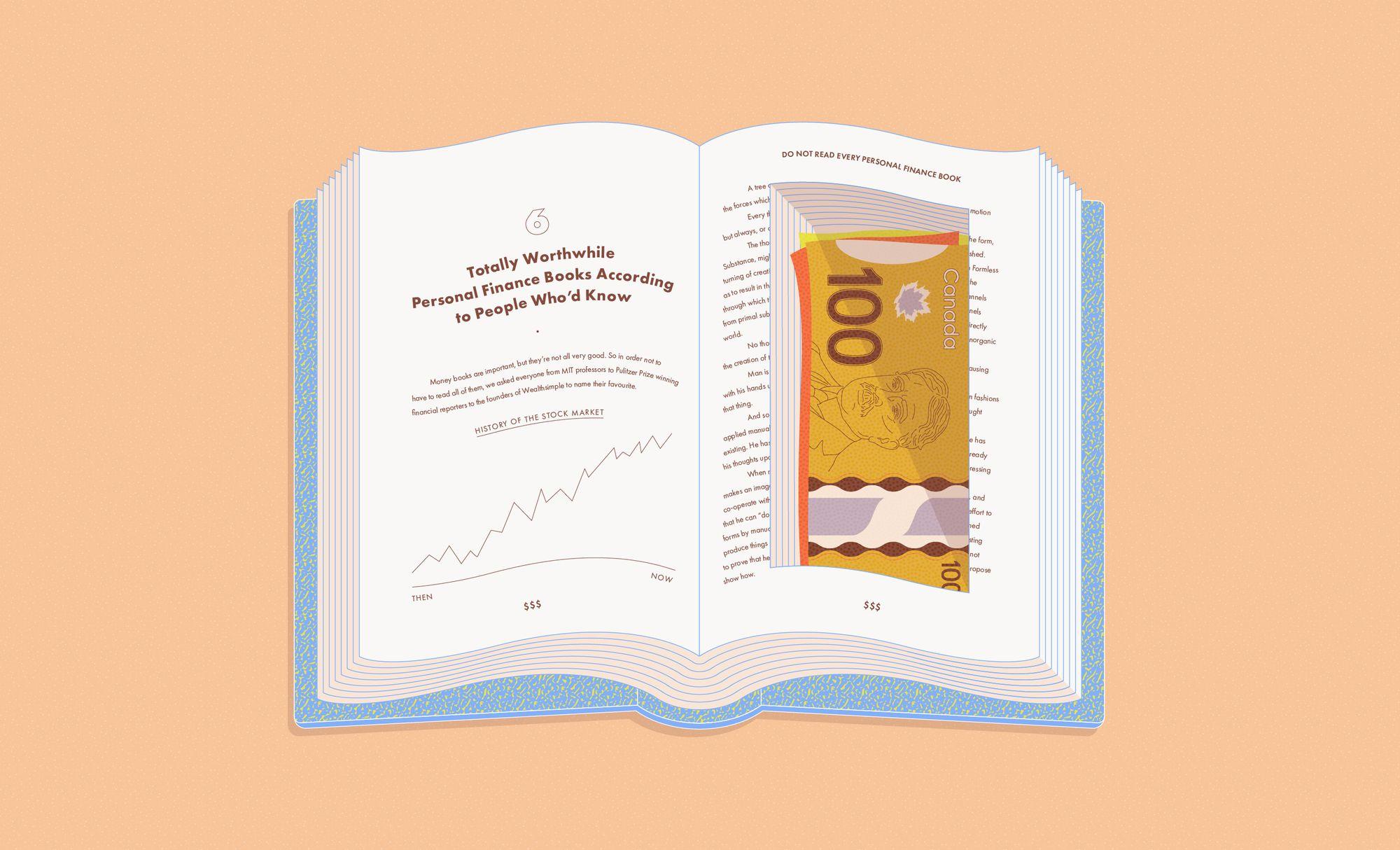
Finance for Humans
Six Totally Worthwhile Personal Finance Books According to People Who’d Know
Money books are important, but they’re not all very good. So in order not to have to read all of them, we asked everyone from MIT professors to the founders of Wealthsimple to name their favourite.
Wealthsimple makes powerful financial tools to help you grow and manage your money. Learn more
No one is born knowing what to do with their money. That’s what books are for. Books are for many things of course, like not feeling alone in the universe, or losing yourself in the magical fabric of other people’s problems or enjoying the beach or reliving terrible periods of bloody war and inhumanity or learning how to write code in C++. But learning what you’re supposed to do with your money, and how to get more of it, is an estimable genre. There are get-rich-quick books, be richer than your neighbour books, retire early books, have fun with taxes, taxes for dummies, and taxes for taxi drivers. (That last one may exist, but we can’t say for sure, because this has not been fact-checked.) But not all money books are created equal. (At Wealthsimple we prefer the idea of getting rich slow instead of getting rich quick, for instance.) Some personal finance books are really boring, some of them offer foolish advice, some of them are riddled with grammatical errors, and others are actually cries for help written in code by a team of accountants held against their will in a financial gulag in a hollowed-out mountain in West Virginia. So the first piece of advice we have to offer is: DO NOT READ EVERY PERSONAL FINANCE BOOK.
But then how do you know which ones to read? Well, the smartest thing to do when you’re looking for any book recommendation is to ask people you trust. So that’s exactly what we did. See below for the ones the pros recommend.
Beth Kobliner, bestselling author of Get a Financial Life and Make Your Kid a Money Genius
A Random Walk Down Wall Street by Burton G. Malkiel changed the way so many people handle money. Malkiel shook things up by questioning the wisdom of Wall Street “experts.” If you aim to pick winning investments, he argued, you’d be just as well off throwing darts at a stock ticker. His advice: don’t pay a financial advisor; instead, buy index funds. And he was right. Since I wrote about A Random Walk in my first book, Get a Financial Life, research by Malkiel and others has consistently shown that over long periods, most active managers have not outperformed the S&P 500 index.

Sign up for our weekly non-boring newsletter about money, markets, and more.
By providing your email, you are consenting to receive communications from Wealthsimple Media Inc. Visit our Privacy Policy for more info, or contact us at privacy@wealthsimple.com or 80 Spadina Ave., Toronto, ON.
Michael Katchen, founder and CEO of Wealthsimple
One of my favourite finance books is Unconventional Success. I have a ton of respect for the author, David Swensen, who's very successfully managed the Yale Endowment Fund since the mid-1980s — his returns rival Buffett's, but he's stayed at Yale rather than do something more lucrative, like launching a hedge fund, because he believes in the work he does to support education. In the book he explains the basics of good portfolio construction thoughtfully but accessibly. So it’s not so sophisticated that only an expert could understand it, but also not too basic like a lot of bestsellers in this category. It's simple without being simplistic, kind of like us, I guess. [Swensen died in 2021, after this article was published.]
Jessica Moorhouse, host of ‘Mo Money Podcast
One book that really changed how I think about wealth, frugality and investing is a book I've been recommending happily for years — Millionaire Teacher by Andrew Hallam. Before I picked it up, I'd read a number of books on investing and found them near impossible to digest. His book made everything click and made the concept of investing no longer intimidating or out of reach. Not to mention that the author's so passionate about educating others about investing, it's impossible not to love him. He even jumps into conversations in my Facebook group to share his knowledge, how many authors do that!?
Kelley Keehn, author of Talk Money To Me
My favourite personal finance book is I Will Teach You To Be Rich by Ramit Sethi. The author uses the concept of a “money dial” that to me is sheer brilliance. He asks readers to rate everything they spend their discretionary income on (travel, clothes, eating out, etc.) and then to choose just one or two of their favourites. Then he asks, what if you 10-x’ed that category?” Like, if you really love travel, what if you went all out? Flew first class, stayed at the most unique hotels and made your experience as incredible as possible? The main take-away from that is we often diffuse our spending, never really indulging and never really fully abstaining, and that doesn’t give us real pleasure in either way. The caveat, of course, is that if you’re going to spend ten times more in one category of spending, you really have to get super frugal on everything else.
Recommended for you
Rudy Adler, Co-Founder and Chief Product Officer of Wealthsimple
Fair warning: this isn’t really a personal finance book. But What You Do is Who You Are by Ben Horowitz is great. Horowitz is one of the founders of the venture capital firm Andreessen Horowitz. And he writes about forming a culture at a company, and how what really forms that culture is what you do — your actions — and not some phrase you write really big on a wall. An interesting part of what he writes about is how money functions in, and affects, company culture. This is a quote I think about a lot:
Here at the firm we wanted to really respect the entrepreneur and the entrepreneurial process. That is tricky in venture capital, because people are coming to ask you for money. So you feel like you are the big person because you have got the money. And they are the little person because they are asking for it. I wanted to reverse that. So we made this rule that if you are late to a meeting with an entrepreneur, there is a fine of $10 a minute. That is steep. But the reason it's there is that it is shocking. You say, "I was making an important phone call on another deal." Or, "I had to use the bathroom. And now I am paying money? Why do I have to pay that exorbitant, ridiculous fine to work here?" And we tell them: building a company is incredibly hard. We respect that so much we will not waste a minute of the entrepreneur's time. If there is a question in anyone's mind about how they should treat entrepreneurs, that rule answers that question.
Chelsea Fagan, author and co-founder of The Financial Diet
We swear by Broke Millennial Takes On Investing: A Beginner's Guide to Leveling Up Your Money by our friend and collaborator Erin Lowry. It’s a great primer for folks who want to invest but find the prospect daunting. I even wrote a review of it: "Erin is uniquely capable of making even the most difficult-to-understand financial concepts into something you actually want to talk about, and investing is no exception. If you are intimidated (or, frankly, bored) by the idea of investing, let Erin prove you wrong."
Riv Virk, director of Play Labs @ MIT
A book that had an impact on me early in my career was Market Wizards by Jack Schwager. The book contained interviews with top traders, and what amazed me was the revelation that psychology and business success were more interrelated than we were taught in school. I remember one of the traders saying that most people who trade in the markets get what they need — psychologically – whether they make money or lose money! This was an eye opener for me, and later I would go on to explore similar themes with entrepreneurs, who are often working through their own hopes, fears and emotions through their startups.
Caroline Corbeil, Wealthsimple Tax’s super tax guru
There’s no point in reading a book about taxes that makes you more intimidated about taxes. Especially since Canada actually has a comparatively simple tax code. Personally I love any kind of tax advice that makes things clear and leaves you feeling empowered. Easy Tax Tips for Canadians by Peggy Ireland is a book that provides just such advice. It’s short and gets right to the point. Which is that you can do your taxes yourself, and save a bunch of money by not paying a preparer. Not that I’m biased or anything.
Want to get more financially literate? Our event series, MoneyTalks — where money genius writers will discuss everything from budgeting to investing — is coming to an Indigo book store near you.
Wealthsimple's education team is made up of writers and financial experts dedicated to making the world of finance easy to understand and not-at-all boring to read.









